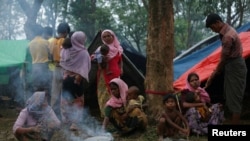The United Nations's human rights chief has joined the growing chorus of international voices condemning Myanmar for the wave of violence that has forced scores of minority Rohingya Muslims to flee across the border to Bangladesh.
Speaking Monday in Geneva before the U.N. Human Rights Council, Zeid Ra'ad al-Hussein said his office has received numerous reports and satellite imagery of Myanmar security forces and local militias carrying out extrajudicial killings and burning entire Rohingya villages. Zeid also cited reports of Myanmar troops planting landmines along the shared border.
"Because Myanmar has refused access to human rights investigators, the current situation cannot yet be fully assessed," he told the council, "but the situation seems a textbook example of ethnic cleansing."
Amnesty International on Sunday charged Myanmar with deliberately targeting Rohingya by placing landmines along the routes that Rohingya refugees use to cross into Bangladesh. The rights organization reported two landmine explosions Sunday, including one that blew off a young man's leg while he was herding cattle near the border.
Zeid issued his report a day after Rohingya insurgents called for a month-long cease-fire to allow humanitarian aid to reach those affected by the conflict. The group encouraged aid groups to “resume their humanitarian assistance to all victims of the humanitarian crisis, irrespective of ethnic or religious background during the cease-fire period."
Fighters from the Arakan Rohingya Salvation Army, as they call themselves, launched an attack on dozens of police posts and an army base late last month, leading to the displacement of more than 300,000 people.
U.S. Ambassador to the United Nations Nikki Haley reminded Myanmar in a statement issued last Friday that while Washington supports the fight against violence in northwestern Rakhine state, humanitarian aid must reach those in need.
Fleeing violence
The latest round of violence and a military counteroffensive killed at least 400 people and triggered the latest exodus of Rohingya villagers to Bangladesh.
U.N. Refugee Agency Asia Director Vivian Tan in Bangladesh told VOA Burmese that aid workers estimate there are about 164,000 new arrivals in Bangladesh.
The United Nations said about 146,000 people have crossed the border into Bangladesh’s Cox’s Bazaar district since August 25.
Officials said the U.N. World Food Program has provided tens of thousands of people with food. The agency said it needs $11.3 million to support the influx of people, in addition to those already living in camps.
Aung San Suu Kyi under fire
Myanmar’s de facto leader, Aung San Suu Kyi, has been criticized for her response to the violence.
Many observers say she has played down reports of the Burmese military's brutal treatment of Rohingya civilians. Aung San Suu Kyi maintains there has been “a huge iceberg of misinformation” about the Rohingya crisis and violence in Rakhine following the attacks on security posts.
A series of Twitter photos that allegedly showed dead Rohingya people were later proved to be unrelated to the current violence, according to a statement posted on Facebook by Aung San Suu Kyi’s office.
The Nobel Peace laureate said “fake information” was used to promote the interests of “terrorists,” a word she used to describe the insurgents.
But a number of her fellow Nobel laureates, the exiled Tibetan Buddhist spiritual leader the Dalai Lama, South African Archbishop Desmond Tutu, and Pakistani activist Malala Yousafzai have issued statements urging her to personally intervene and end the violence.
International pressure
Other human rights advocates are also urging the Burmese government to stop the violence.
“The governments of the world have to press very hard on Aung San Suu Kyi and also the Burma military to stop the violence,” Human Rights Watch’s Deputy Asia Director Phil Robertson told VOA, adding that independent monitors should be granted access to assess allegations of serious human rights violations made by ethnic Rohingya refugees who have fled into Bangladesh.
Robertson urged the United States and the international community to provide more humanitarian relief and medical assistance to the refugees.
“So far we have seen very little comments from the Trump administration about the situation which is quite shocking,” he said.
Abuses against and restrictions on members of the Rohingya population were cited as one of the leading human rights problems in Myanmar, according to the State Department's 2016 Human Rights Report (( www.state.gov/j/drl/rls/hrrpt/humanrightsreport/index.htm?year=2016&dlid=265324#wrapper ))
The Rohingya are one of Myanmar's many ethnic minorities in the Buddhist-majority nation. The Myanmar government considers the Rohingya to be economic migrants from Bangladesh, and it has never granted them citizenship, even though most can show their families have been in the country for generations.
VOA's Burmese Service contributed to this report.





